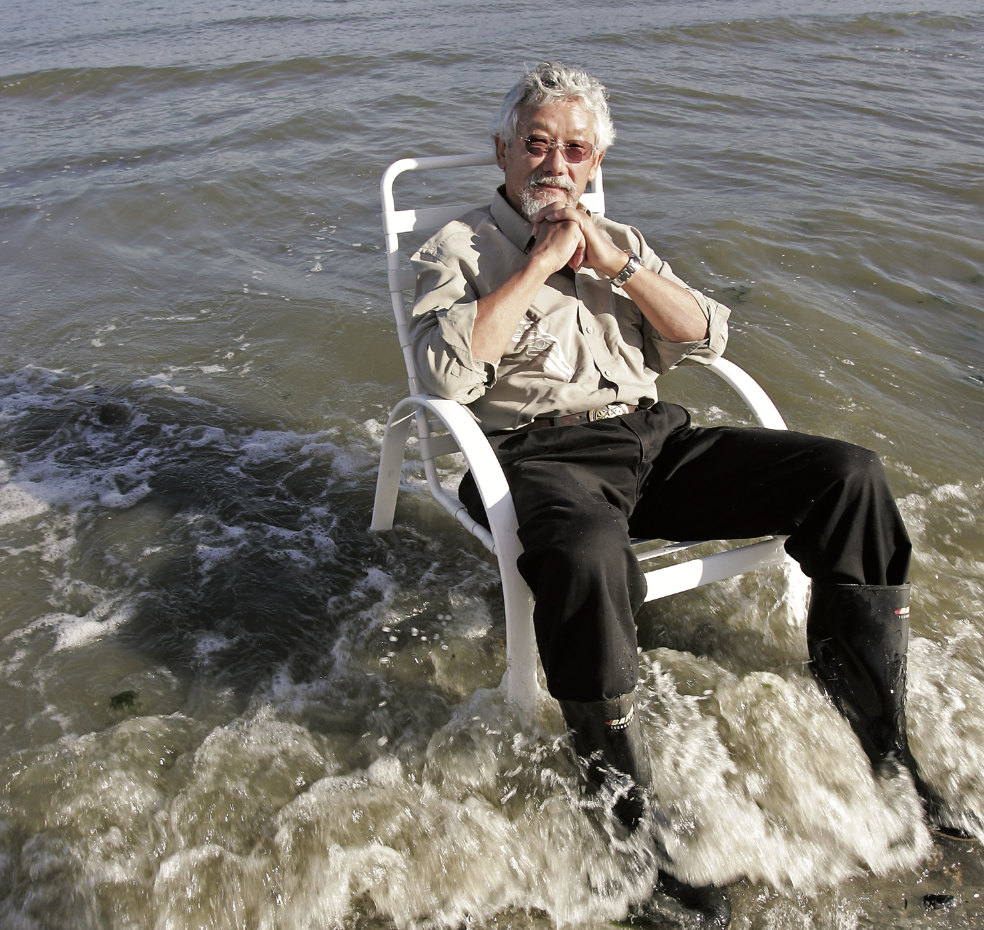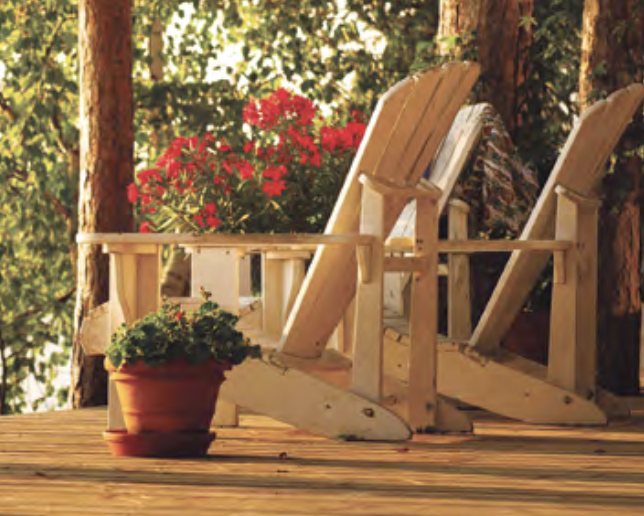One of the world’s most ardent defenders of the environment reflects on the past—and our future
By Rob Lutes
You’re a third-generation Canadian—your grandparents came here from Japan in the early 20th century, is that right?
Yes. Like all immigrants, they came to Canada for opportunity, and, of course, as people of colour, like African Canadians or any other Asians, they weren’t allowed to vote. They couldn’t own property in large parts of British Columbia. They were excluded from many professions. But they knew that if they worked hard and kept their noses down, there was opportunity.
They never learned to speak English, and so although the family gathered for dinner, I never had a conversation with either set of grandparents. My mum and dad were fluently bilingual, but they had no roots in Japan. My father always said, “You’re in Canada; learn French if you’re going to learn.” He was very proud that in high school he took French. It’s one of my great regrets that I never did learn Japanese. It would have added a tremendous amount to my life to have had that part of my language.
I’ve read that it was your father who inspired your love of nature.
My dad should have been a scientist. He loved nature. From a young age, I remember him telling me the story…my grandfather was a boat builder and a fisherman, and they went out to one of the islands here. My dad, who was just a kid, discovered some arbutus trees, which are beautiful trees with dark-red trunks, and he dug up some small ones to take home. My grandfather said, “What the hell is this?” and threw them into the ocean.
That was an indication, you know, that my dad was always under pressure from his mum and dad, even when I was growing up. I remember them bawling my dad out: “You could have been working and you took a Saturday off to go camping and fishing with your son!” There was always pressure on him to work, to be a model for his siblings and his kids.
You pursued your education a long way, earning a master’s degree and a Ph.D. in the United States. Was school easy for you?
Yes. I was what they called a “brain.” And if you were a brain, it was terrible, you know? But I want to tell you the important things in my life…. When I was in my last year of college, October 4, 1957—I’ll bet you don’t know what happened then.
October 4, 1957?
Sputnik.
The Russians beat the Americans.
And that satellite going overhead every hour and a half was like the USSR thumbing its nose and saying “Look!” The Russians launched the first animal into space, the first man, the first team of cosmonauts, the first woman. The American response was unbelievable. They said, “We’ve got to catch up to these guys.” They started pouring money into it. In 1962, John F. Kennedy famously said, “We intend to get our astronauts to the moon and back within a decade.” And that’s a really important point, because he didn’t know how the hell they were going to do it, right? They just said, “We’ve got to do it.” And not only did they do it in less than a decade but they were the only country to land people on the moon and get them back here.
But what are the consequences? Every year when Nobel prizes are announced, who gets a huge chunk of them? American scientists or scientists working in America. Yeah, because 60 years ago, Kennedy said, “We choose to go to the moon.” Every year, NASA publishes a magazine called Spinoff, which lists hundreds of things that have spun off from the space program, from laptop computers to space blankets. And I keep telling Americans, “It’s un-American for you to say we can’t do anything about climate change. It’ll cost too much.” That’s not the America I knew. I keep telling the Canadian government, “All you have to do is make that commitment to avoid total catastrophe with climate change.” Make that commitment and magic will happen. Stop saying we can’t afford it. Just make the commitment.
You’ve spoken about the importance of taking a long view on the environment.
Yes, and how do we do that? The fact is, the only group able to pull back like that are Indigenous people. Indeed, Indigenous people talk about seven generations—you think back on seven generations, on what you’ve inherited from your ancestors, and then whatever you do, what are you leaving for seven generations in the future?
This is why your [magazine’s] audience is very important. Elders have lived a life. They have learned a lot. Our lessons are learned through our mistakes. This is the time when they’re most important. You’re near the end of your life. But do you care about the ones who are coming behind you? Get off the couch or the golf course and start talking to young people and sharing what you’ve learned in a lifetime. As elders, we’ve got to. I think giving in to despair is really giving up. And we can’t afford that now.
Before you worked in television, you were a university professor. Did you like teaching?
I did. And the thing is, I was good at it. My father always said the trouble with Japanese Canadians is that they are too shy. He said, “If you want to succeed in Canada, you have to be able to get up and speak extemporaneously.” And so he made me go into public-speaking contests, and he trained me to be a speaker. So I’m grateful to my father.
How did you transition from professor to TV personality?
It was just a fluke. The University of Alberta had a program on the local CBC channel called Your University Speaks. It was a low-tech thing, a half an hour once a week on Sundays, and they got professors who could speak well. And someone heard that I was a good teacher and they asked me. After three or four shows, I started meeting people who would say, “Hey, that was a great show.” That’s when I realized “holy cow, this is a powerful avenue for education.”
Did someone mentor you in your broadcast work?
Yes. Jim Murray, the executive producer of The Nature of Things, all the time that I worked there until he retired and then died. Everything I’ve learned about making shows I learned because Jim would have me sit in and look at how they handled the sound and the visuals and the mixing. He was a tremendous educator for me, and he defended me like mad. When we did a show on fossil fuels, or on the chemical industry, the forces of these corporations were immense, demanding that they get me off the program. If you’re standing up for the things that matter, people are always going to be mad at you.
You began hosting in 1979, and in 2022 you retired. How does that feel?
Well, I’d wanted to leave the show for many years. They kept saying, “You’re so tightly tied to the series now that if you left, the chances are they’re going to cancel it.” To me, the crucial thing was to keep the series on air because it is so important. And it’s never been more important than now.
In your view, what’s the state of the planet now?
The planet is fine. The planet’s been around for four and a half billion years. And humans are a very recent addition. It will go on after humans are gone. But there have been five episodes in which the vast majority of animals and plants have disappeared. We’ve had these extinction crises, and each time, life has recovered and flourished. Ninety-nine point nine, nine per cent of all species that have ever existed are extinct, right? Extinction is natural and necessary for life to evolve because conditions are always changing, but they are changing over geological time. We’ve accelerated the extinction 1,000 to 10,000 times faster than what is normally going on. And since we’re a top predator on the planet, the chances are very high we’re going to be among those going extinct. And as I say, it’s not unnatural; what’s unnatural is that it’s happening so rapidly and we’re causing it.
Where is your hope…or do you have any?
I have hope for very concrete reasons. One is that we don’t know enough to say it’s too late. Nature has shocked us in the past. And I believe that if we can pull back and give nature room, she will continue to shock us far beyond anything we deserve.
But we’ve got to back that up by acting. If you just say “Oh, well, it’s too late,” you’ve given up. So get out of the way. Maybe you say “Well, yeah, but what can I do?” Come along. Because we’ve got lots of things that you can do.






